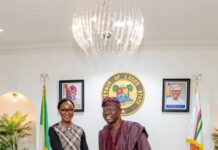In a renewed push to accelerate the delivery of bilateral agreements with China, the Federal Government of Nigeria has reconvened an inter-ministerial meeting to evaluate and expedite the implementation of outcomes from the 2024 Forum on China-Africa Cooperation (FOCAC) Summit and President Bola Ahmed Tinubu’s state visit to Beijing.
Organized by the Ministry of Foreign Affairs in collaboration with the Nigeria-China Strategic Partnership (NCSP), the high-level session brought together representatives of key Ministries, Departments, and Agencies (MDAs) involved in bilateral cooperation. The meeting, chaired by Ambassador Janet Olisa, Director of Regions at the Ministry, served as a platform for MDAs to share progress updates, highlight bottlenecks, and propose practical steps for accelerating the execution of agreements reached with Chinese authorities.
Ambassador Olisa reiterated Nigeria’s commitment to maximizing the benefits of its strategic alliance with China. She emphasized the importance of converting signed Memoranda of Understanding into real projects that will impact the economy and improve the lives of citizens. According to her, Nigeria’s goal is to ensure that its cooperation with China drives inclusive development through targeted investments.
The meeting delved into challenges slowing down project execution, including legal and institutional constraints, and explored ways to align implementation strategies across government institutions. Discussions also focused on Nigeria’s plan to access a significant portion of China’s $51 billion green infrastructure fund for Africa. The country is targeting at least $10 billion in funding for key sectors such as agriculture, digital economy, and national infrastructure.
Director-General of the Nigeria-China Strategic Partnership, Mr. Joseph Tegbe, stressed the importance of coordination among agencies and urged MDAs to adopt a proactive stance to unlock the full potential of the partnership. He described the collaboration as a timely opportunity for Nigeria to attract much-needed investments that can stimulate job creation, economic diversification, and long-term growth.
The meeting concluded with a consensus on the need to harmonize legal frameworks, align project roadmaps, optimize budgetary planning, and establish dedicated technical committees to drive execution. A follow-up review session has been scheduled in the coming weeks to monitor progress on agreed actions, as MDAs continue with internal consultations to resolve implementation hurdles.
The Nigeria-China Strategic Partnership is a key component of the Tinubu administration’s Renewed Hope Agenda and is aligned with China’s Belt and Road Initiative, both of which are expected to catalyze transformative development across Nigeria.














